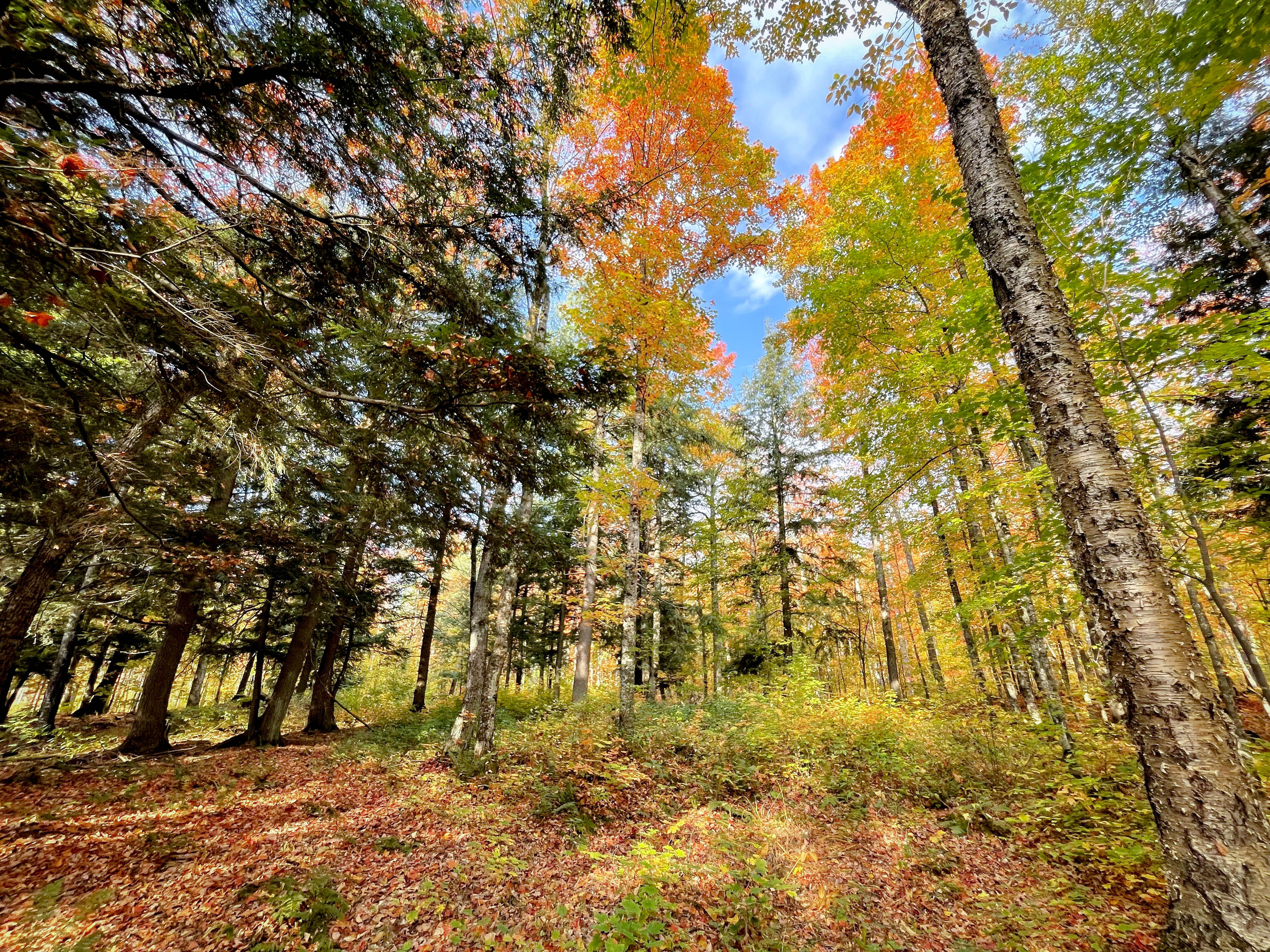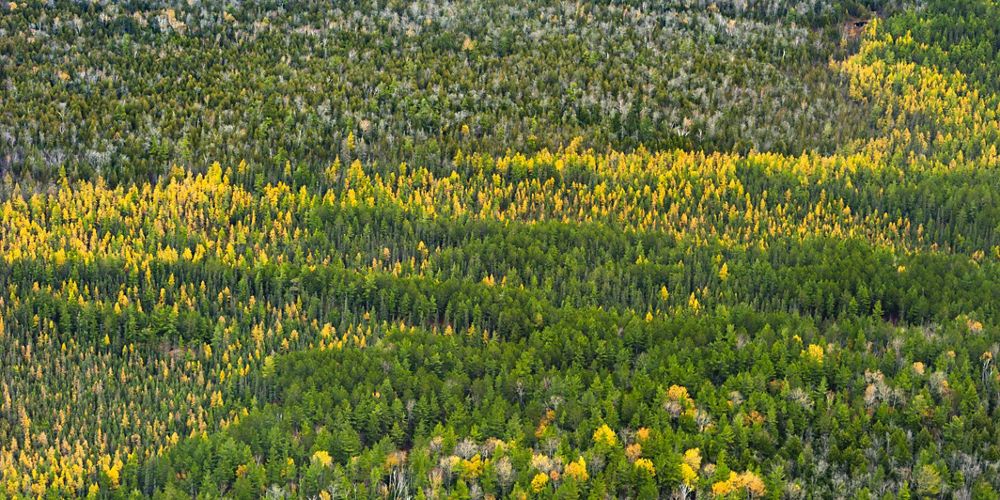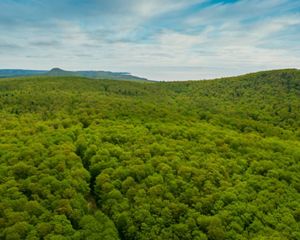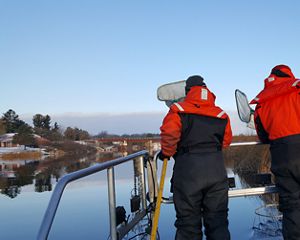
Hunting on TNC Lands in Michigan
Hunting is a part of Michigan’s history and culture, and it can also play an important role in conservation.
Interested in Hunting?
Hunting opportunities are available in both the Upper and Lower Peninsulas. Currently, there are six properties enrolled as Commercial Forest Lands (which allow public access to hunting and fishing) and 15 preserves that have hunting programs and require a TNC-issued permit.
Please read the article for full guidelines and contact information.
At some of our nature preserves, in both the Upper and Lower Peninsulas, white-tailed
deer populations have grown well beyond the ability of plant communities to withstand their browsing. We use hunting as a tool to control deer populations and reduce the damage they are causing, allowing plant communities to recover their full vigor and diversity.
In addition, some of our lands are enrolled in the Commercial Forest Program, which
requires they remain open to public foot traffic for hunting, trapping and fishing. On
these lands, we allow all legal hunting with access on foot only. While motorized access is not allowed, public roads run through or near our forest reserve properties.

Background
Why We Allow Hunting
Natural ecosystems are not adapted to the high population levels of white-tailed deer and are being degraded through the over-browsing of the shrub and ground cover layers. Some shrubs, such as the Canada yew, are in severe decline throughout most of the state due to this browsing pressure. Several tree species (such as northern white-cedar, sugar maple, eastern hemlock and several oaks) that are preferred as browse are failing to regenerate where deer numbers are high. If the pressure continues, the composition of Michigan’s forests will be changed, perhaps irreversibly.
Deer also prefer some herbaceous plants over others, and the decline or disappearance of some species has been attributed to deer browsing activity. These changes in vegetation that result from deer browsing have been shown to affect birds. In heavily browsed areas, the shrub layer is virtually absent or is populated almost entirely by species (such as balsam fir or leatherwood) that deer tend not to eat. Animals that nest or forage in the shrub layer are not, in some cases, able to adapt to such dramatic changes in forest structure and must find suitable habitats elsewhere or persist at low numbers.
Michigan wildflowers are also impacted by deer browse. Houghton's goldenrod and the dwarf lake iris are two federally and state-threatened wildflowers that can be found at our northern lower preserves. Hunting helps protect these flowers and allows them to continue to grow.
Where We Allow Hunting
Hunting opportunities are available in both the Upper and Lower Peninsulas. Currently, there are six properties enrolled as Commercial Forest Lands and 15 preserves that have hunting programs.
Please refer to the map for hunting opportunities.
Preserves & Reserves
Hunting on TNC Preserves and Reserves Click on the points to determine what type of hunting is allowed, if a TNC permit is needed, and if there are permits available.
Hunting on TNC Reserves
The Nature Conservancy (TNC) has six Upper Peninsula properties enrolled as Commercial Forest Lands in the State of Michigan. On these properties, TNC employs a conservation strategy that includes sustainable timber harvesting to demonstrate managing forests in a way that promotes ecological values and reaps direct economic benefits. The Commercial Forest Act provides public access for hunting and fishing, but does not allow motor vehicle access, camping, tree cutting, structures or other related activities.
Accessing the Reserves
-
The following TNC reserves are enrolled in the Commercial Forest Program (CFP):
- Keweenaw Heartlands
- Lon Matthews Reserve at Mulligan Creek Highlands
- Raptor’s Roost Reserve
- Two Hearted River Forest Reserve
- Wilderness Lakes Reserve
- Slate River Forest Reserve (only 10% of the property is currently enrolled in the CFP; please reference the DNR’s Mi-HUNT map if planning to hunt at Slate River)
-
To hunt on TNC reserves, you must agree to the following rules and statements. Leaseholders should refer to their TNC documentation for guidelines.
- Hunters must adhere to all MI Department of Natural Resources rules and regulations, must comply with all relevant local, state and federal laws and ordinances governing hunting activities such as seasons and harvest limits, and must obtain all required government licenses or permits.
- To prevent unintended harm to other preserve users, no long-range shooting is allowed across open fields, marshes or roads. Unnecessary shooting or shooting at targets is prohibited.
- No hunting is allowed within a 200-yard radius of any inhabited dwelling.
- Alcohol is not allowed on TNC reserves or in preserve parking lots.
- No fires, smoking, camping, littering (including the use of plastic flagging) or dumping of ashes, trash, garbage, chemical waste or other unsightly or offensive material on TNC property.
- No cutting, breaking or clearing of vegetation.
- Planting of food plots or other vegetation is not allowed.
- Permanent blinds and stands are not permitted. Any blinds or stands not removed by the hunter shall become the property of TNC.
- Off-road vehicles are only permitted on DNR-designated routes.
- TNC is not responsible for any lost or stolen items.
Hunting on TNC Preserves
Hunting is allowed at seven nature preserves in the Lower Peninsula and eight nature preserves in the Upper Peninsula. Hunting at these preserves is limited to white-tailed deer only, and a TNC-issued permit is required (see below). All Lower Peninsula preserves are at capacity; however, we do maintain a waiting list for each.
Accessing the Preserves
-
Lower Peninsula
- Grand River Fen Preserve
- Grass Bay Preserve
- Ives Road Fen Preserve
- Nan Weston Preserve at Sharon Hollow
- Paw Paw Prairie Fen Preserve
- Ross Coastal Plain Marsh Preserve
- Thunder Bay Preserve
Upper Peninsula
- Carl A. Gerstacker Preserve at Dudley Bay
- Haunted Forest Preserve
- Helmut and Candice Stern Preserve at Mt. Baldy
- Laughing Whitefish Lake Preserve
- Mary Macdonald Preserve at Horseshoe Harbor
- Maxton Plains Preserve
- McMahon Lake Preserve
- Swamp Lake Preserve
-
To hunt on TNC preserves, you must agree to the following rules and statements.
- Deer hunting is not permitted on all preserves.
- All hunters must carry a TNC-issued permit while hunting on a preserve.
- Only white-tailed deer may be hunted; no other species may be hunted or trapped; no collection of plants and animals other than deer. The hunter must report how many deer were taken (and gender of deer) upon expiration of the permit.
- Permits are personal to the hunter and may not be used by or assigned to any other individual.
- All persons, including minors, accompanying the hunter must have a TNC-issued permit. Hunters may request a permit to allow one minor child to accompany the hunter on the property. The child must be at least 10 years of age and less than 17 years of age, have all license or permits required to hunt under Michigan law, and must have completed a course in hunting safety approved by the MDNR.
- All hunting must be done within designated areas.
- To prevent unintended harm to other preserve users, no long-range shooting is allowed across open fields, marshes or roads. Unnecessary shooting or shooting at targets is prohibited.
- No hunting is allowed within a 200-yard radius of any inhabited dwelling.
- No trapping or snaring is allowed.
- Alcohol is not allowed on TNC preserves or in preserve parking lots.
- No fires, smoking, camping, littering (including the use of plastic flagging) or dumping of ashes, trash, garbage, chemical waste or other unsightly or offensive material on TNC property.
- No cutting, breaking or clearing of vegetation. Planting of food plots or other vegetation is not allowed.
- Only two (2) temporary, non-damaging deer stands are permitted. No tree spikes, steps or any implement that will damage trees are allowed. All stands must be removed prior to expiration of the permit. The hunter shall place his/her name and contact information on the stand. Any stands not removed by this date shall become the property of TNC.
- One (1) temporary trail camera is permitted. All cameras must be removed prior to expiration of the permit. The hunter shall place his/her name and contact information on the camera. Any cameras not removed by this date shall become the property of TNC.
- Parking of vehicles is only allowed in designated parking areas. Access to the property must be from the designated parking areas or along the existing road. No off-road vehicle use.
- In addition to the above rules, hunters must comply with all local, state and federal laws and ordinances governing hunting activities, including obtaining all required government licenses or permits.
- TNC is not responsible for any lost or stolen items.
Applying for a Permit
The deadline for applying for a hunting permit is on or around June 15. If you are interested in hunting white-tailed deer on TNC preserves, please call 517-316-0300 ext. 8 or email michiganhunting@tnc.org.
TNC Preserve Hunting Permits
A TNC permit is required to hunt white-tailed deer at any of our nature preserves (not on Commercial Forest Lands). There is a fee to hunt at our Lower Peninsula preserves, excluding Grass Bay Preserve. Currently, there is no fee to hunt at our Upper Peninsula preserves. All Lower Peninsula permit fees are per person at the following rates:
- Archery Season Only—Adult: $100.00; Minor: $80.00
- Firearm Season Only—Adult: $100.00; Minor: $80.00
- Combined Seasons—Adult: $200.00; Minor: $160.00
Permits are renewed annually if the hunter has complied with the program guidelines and at the discretion of TNC. Removed hunters are replaced with interested hunters from the waiting list in the order they were added. Spots are available on a first-come, first-served basis at preserves with openings.
Hunting FAQs
-
At some of our preserves white-tailed deer populations have grown well beyond the ability of plant communities to withstand their browsing. We use hunting as a tool to control deer populations and reduce the damage they are causing, allowing plant communities to recover their full vigor and diversity. The Nature Conservancy allows hunting for white-tailed deer on preserves to reduce the threats too many deer pose to our conservation targets and to ensure that the preserve does not become a “refuge” for deer during the hunting season.
-
TNC’s nature preserves offer an opportunity for people to connect with nature in various ways, in all seasons. Throughout the year, we post notice that hunting is allowed at the entry points to our preserves so that non-hunters are aware that hunting could be taking place. We recommend that visitors wear blaze orange or neon pink for visibility and safety on the preserve during these hunting seasons.
-
We allow hunting, by permit only, of white-tailed deer. At this time, other species do not cause the ecological damage that deer do, so management of them by hunting is not necessary. In addition, some of our lands are enrolled in the Commercial Forest Program, which requires that they remain open to public foot traffic for hunting, trapping and fishing. On these lands, we allow all legal hunting with access on foot only. Permanent blinds and motorized access are not allowed.
-
We use hunting as a tool to control deer populations and reduce the damage they are causing. Planting corn or food plots, especially any non-native species can be detrimental to the natural ecosystem we are protecting and restoring at any given site and the purpose of the hunting program is to control deer populations on the preserves at non-damaging levels. Attracting additional deer is counter to our management objective.
-
Some properties owned by TNC contain recreational hunting leases. Leaseholders and their guests have exclusive rights to hunt within their lease, and leases are considered private property. Leaseholders must follow all state and federal regulations that pertain to hunting, fishing and trapping. Members of the public hunting on adjacent Commercial Forest lands that TNC owns must respect the private property rights of leaseholders.
-
As previously mentioned, all TNC's forest reserve properties are at least partially enrolled in the Commercial Forest Act. To find out if an area in or adjacent to a TNC property is in the Commercial Forest Act, please refer to the MIDNR's Mi-HUNT Map.

Nature News in Your Inbox
Sign up to receive monthly conservation news and updates from Michigan. Get a preview of Michigan's Nature News email.



